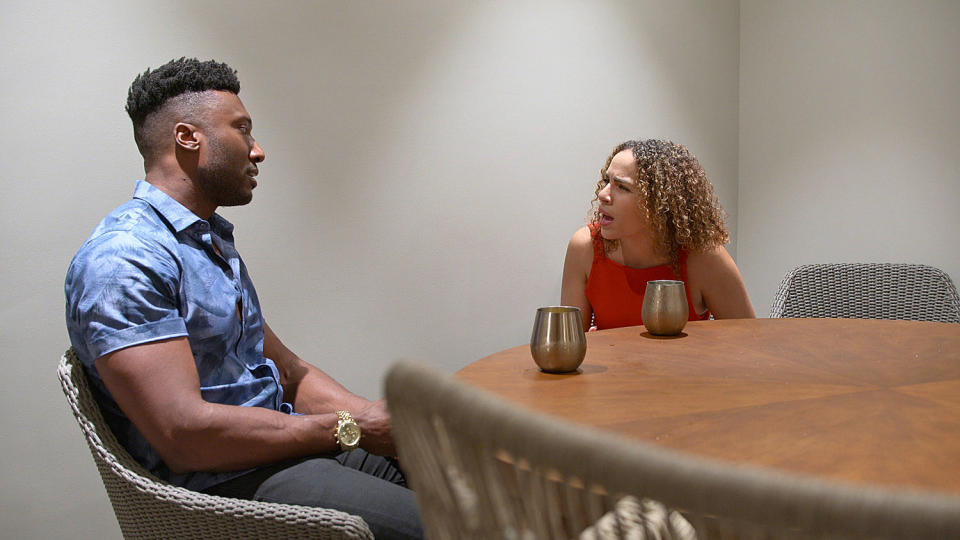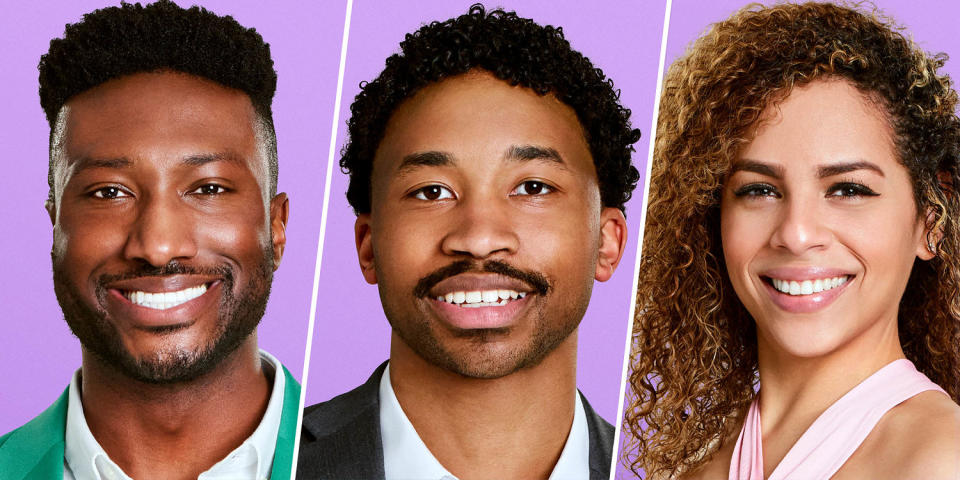Uche and Lydia's complicated 'Love Is Blind' relationship, unpacked by a therapist
- Oops!Something went wrong.Please try again later.
Uche Okoroha and Lydia Velez Gonzalez came on Season Five of "Love Is Blind" with history. And history, for a show that tries to turn contestants into blank slates, poses a problem.
Halfway through the season, it was revealed that the couple had dated prior to coming into the pods for the show's fifth season, based in Houston, Texas. And according to Lydia, the two had been intimate just three months before coming onto the show.
The revelation had reverberations for both cast members' relationships — and the entire tone of the season. This fifth iteration of "Love is Blind" had the fewest on-screen engagements to date (although there were apparently several more that were never aired) and arguably the most ... entanglements.
Below, TODAY.com unpacks Uche and Lydia's dynamic with psychologist and reality TV enthusiast Kelsey Latimer, who says dating shows like "Love Is Blind" can help viewers "figure out life" and relationships.
Latimer says that first and foremost, viewers should remember that producers do likely cast members with plot points in mind. "It's important to understand that producers pick extreme personalities who may interact dramatically and play out on the drama train. It’s expected in any reality TV that that will happen — otherwise, it’ll bomb," she says.
Caveat aside, Latimer says Uche and Lydia's situation can illustrate a type of configuration that might hit feel familiar for some viewers. Here's what to know.
What happened between Uche and Lydia (and Milton and Aaliyah)?
To quote "Love Is Blind" viewers, what happened is...mess.
The show's producers seem to agree. Chris Coelen, executive producer of the Netflix reality show, told Variety he was “totally blindsided” that the two had dated. "It was a complete shock. To be honest, it was like, ‘What are we gonna do?’ Nobody had any idea," Coelen said.
Production intervened to contain the situation in the pods, per Coelen's interview with Variety. Barred from speaking to one another, both contestants decided to stay and pursue relationships with other people: Uche with Aaliyah Cosby; Lydia with James “Milton” Johnson IV.
But Uche and Lydia's past bond still managed to interfere with their new ones.
Aaliyah abruptly decided to leave the pods after a conversation with Lydia, the specifics of which were never fully revealed. Lydia had befriended Aaliyah, saying she "saw herself" in her, especially as she went through a conflict with Uche.
“To this day, I don’t really know what her intentions were 100 percent,” Aaliyah told TODAY.com. “But I do feel like, after just having discussions with her, I understand where she may have been emotionally and what guided her decision making throughout everything — as far as just navigating having a friendship with me and having the past relationship with him.”
Aaliyah and Uche met up after the pods. While the edit makes it seem like they ended their relationship, Aaliyah confirmed to Us Weekly they dated "for a while" but "it didn't work out."
Out of the pods, the series showed Uche and Lydia confronting each other about old grudges. Uche suspected that Lydia knew he was coming on the show. He also was concerned that Lydia "stalked" women he followed on Instagram by viewing their Instagram stories. She also drove by his house. Lydia, on her end, alleged that Uche had cheated on her.
Lydia and Uche's confrontation happens in Episode Seven, with Lydia's fiancé Milton not far away. While Milton had to adjust to learning Lydia had dated Uche, he stood by her after the confrontation with Uche.
“I’m not really concerned about anyone that’s dated her in the past. The same way she wouldn’t care about anyone I’ve dated in the past. We were there because we both wanted the chance to potentially get married and find a partner," he told TODAY.com.
A therapist says Uche and Lydia embody a 'drama triangle'
Psychologist Latimer says Uche and Lydia's relationship is an example of a "drama triangle."
A "love triangle," as many a romance reader knows, is when one person feels drawn toward two potential partners. A "drama triangle" is another arrangement entirely — and one that might be even more common.
“The most healthy people get into these situations, too,” Latimer says. “It comes with life.”
There is someone in the victim role, rescue role and perpetrator role. "The idea with the triangle is that we don't stay in one position. It's a power play," she says. "We can start as a victim, be really upset, and become a perpetrator."

Take Lydia's arc, as an example. Latimer says Lydia might have felt she was a victim of cheating, then lashed out and "took power back" by following his Instagram activity. Then, she became a rescuer for Aaliyah. "She's her advocate, but not really, because she's trying to get information," Latimer says.
"That's how confusing it is. We can move back and forth along the triangle," she says.
At the center of the drama triangle is “intensity,” which people can “confuse with connection.” Latimer says this often happens with younger people who don’t have enough experience in relationships to discern between healthy and unhealthy. “They get really excited. 'The emotions are high, so that must mean I’m really interested. He or she is jealous, which must mean they like me.'"
The trouble with this configuration, Latimer says, is that it's based around power — and "someone's going to win, and someone's going to lose."
The empowerment triangle
The counterpart to the drama triangle is the empowerment triangle according to Latimer. While there are three roles — creator, a coach and a challenger — two people can play out an empowerment triangle.
The empowerment triangle is healthier — but it's "not as exciting," Latimer says, because there's less drama. “Everybody gets to have an equal center of power," she says.
At the same time Lydia is involved in a drama triangle, Latimer says she and Milton exhibit more of an empowerment triangle, calling it an "excellent contrast."

"They both have a voice, they listen and can be playful with each other. And they can fight fairly," she says.
When they fight, they challenge each other, not "attack" each others' character. "They have disagreements, but have a foundation of care for each other. They don't drag each other through the dirt, and instead focus it on the topic and what they don't agree with," she says. "That's what i'm looking for in a healthy relationship. Not if there's a disagreement or not, but how do you handle it?"
Latimer says this season of "Love is Blind" shows how a healthy and an unhealthy relationship can bring out "different sides" of the same person, like Lydia. "When we're not in the right relationship, it can bring out the negative side to all of us," she says.
"With an empowerment triangle, everybody has a voice. There's not a power play," she says.
Are you in a drama triangle? Here's what to do
Latimer says anyone can find themselves in this type of configuration. "You're going to have situations where you don't fight fair," she says. "The point is when you're on the drama triangle, to check yourself."
She tells her patients to first, "identify where they are" in a drama triangle. Is it you? Or is it the relationship?
Then she recommends patients "take some space" and "breathe through" what it takes to come back to a place where they can feel empowered.
“Nothing good is going to happen on the drama triangle. You're going to say things you don't mean. You're going to hurt people. You might hurt yourself," she says.
Consider your past relationships. If they all ended dramatically, it may be a key that something is happening that "you need to reflect on" with the help of a professional.
This article was originally published on TODAY.com

